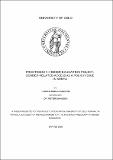| dc.description.abstract | Over the years, higher education in Kenya has been characterised by gender disparities. A gendered analysis of admissions at University illustrates a low representation of females. But, the Kenyan governments’ policies in higher education, should have attended to this problem. Hence, this study seeks to examine the governments’ gender-related access policy making processes in higher education.
This thesis discusses how the gender-related access policy making process in Kenya’s higher education can be analysed. It highlights the government of Kenya’s adoption of gender-related access policies following the 1990 Education For All (EFA) Jomtien Conference, which includes a pressing need of addressing gender equity issues in education, especially in ensuring access to education for girls and women, and removing barriers that hamper their active participation.
Further, this study shows that it is useful to distinguish between different stages in the gender related access policy making process. However, the separations between the stages are not black-and-white and decision-making continues in the implementation and evaluation stages. Consequently, policy making is a complex, iterative process that may not be predetermined from start to finish.
This study indicates the intricacy of coming up with policy issues or problems, policy objectives and policy instruments. However, there are challenges in the implementation of gender-related policies thus this thesis posits competing views in the practices of policy making and implementation in Kenya, by EFA and through the work of non governmental organisations, in this case FAWE. Consequently, this thesis explores the governments’ policy making practice with regards to gender-related access policy formulation and implementation in Kenya’s higher education | en_US |

